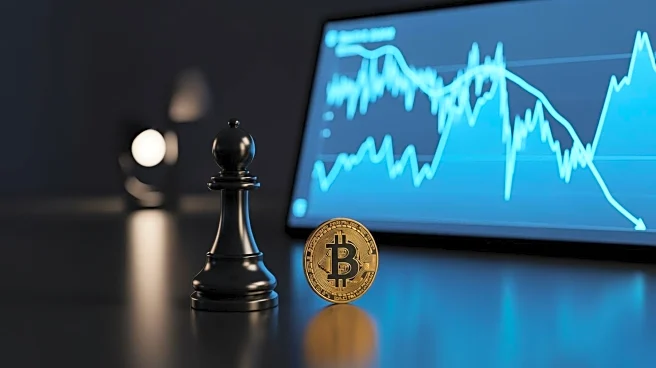What's Happening?
GameStop's stock is trading near fresh 52-week lows despite the company achieving profitability. As of November 15, 2025, GameStop (NYSE: GME) trades around $20-21 per share, down roughly 30% year-to-date.
The company has reported a multiquarter profit streak and holds significant cash and Bitcoin reserves. Recent developments include a strategic pivot towards Bitcoin as a treasury reserve asset and a focus on trading cards and collectibles. GameStop issued warrants for shareholders, allowing them to purchase additional shares at a set price, which could lead to potential dilution.
Why It's Important?
GameStop's situation highlights the challenges faced by companies transitioning from traditional business models to new strategies involving cryptocurrency and niche markets. The stock's decline, despite profitability, reflects investor skepticism about the company's long-term viability and strategic direction. The involvement of Bitcoin introduces volatility, tying GameStop's fate to crypto market fluctuations. The warrant issuance adds complexity to the stock's valuation, impacting investor sentiment and market dynamics.
What's Next?
GameStop's upcoming Q3 2025 earnings report, expected on December 9, will be a key indicator of the company's financial health and strategic progress. The performance of Bitcoin and the success of the trading card pivot will significantly influence GameStop's market perception. Investors will closely watch warrant trading and exercise behavior, as well as the company's execution on trading cards and collectibles. The broader meme-stock cycle and ETF impact could also drive sharp, liquidity-driven moves in GameStop's stock price.
Beyond the Headlines
GameStop's transformation into a Bitcoin-heavy holding company raises questions about the sustainability of such strategies in traditional retail sectors. The company's focus on trading cards and collectibles reflects broader trends in consumer behavior and market demand for niche products. The potential for significant stock price volatility underscores the risks associated with meme stocks and speculative investments.










